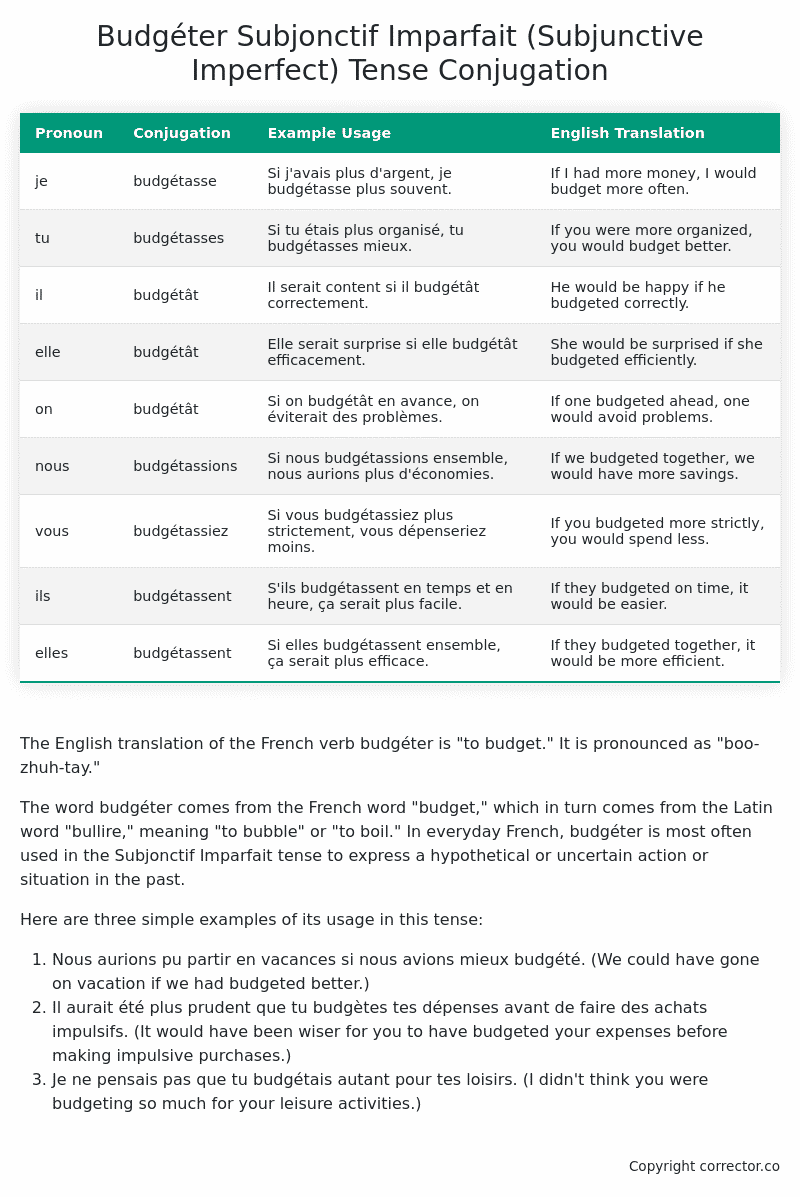Subjonctif Imparfait (Subjunctive Imperfect) Tense Conjugation of the French Verb budgéter
Introduction to the verb budgéter
The English translation of the French verb budgéter is “to budget.” It is pronounced as “boo-zhuh-tay.”
The word budgéter comes from the French word “budget,” which in turn comes from the Latin word “bullire,” meaning “to bubble” or “to boil.” In everyday French, budgéter is most often used in the Subjonctif Imparfait tense to express a hypothetical or uncertain action or situation in the past.
Here are three simple examples of its usage in this tense:
- Nous aurions pu partir en vacances si nous avions mieux budgété. (We could have gone on vacation if we had budgeted better.)
- Il aurait été plus prudent que tu budgètes tes dépenses avant de faire des achats impulsifs. (It would have been wiser for you to have budgeted your expenses before making impulsive purchases.)
- Je ne pensais pas que tu budgétais autant pour tes loisirs. (I didn’t think you were budgeting so much for your leisure activities.)
Table of the Subjonctif Imparfait (Subjunctive Imperfect) Tense Conjugation of budgéter
| Pronoun | Conjugation | Example Usage | English Translation |
|---|---|---|---|
| je | budgétasse | Si j’avais plus d’argent, je budgétasse plus souvent. | If I had more money, I would budget more often. |
| tu | budgétasses | Si tu étais plus organisé, tu budgétasses mieux. | If you were more organized, you would budget better. |
| il | budgétât | Il serait content si il budgétât correctement. | He would be happy if he budgeted correctly. |
| elle | budgétât | Elle serait surprise si elle budgétât efficacement. | She would be surprised if she budgeted efficiently. |
| on | budgétât | Si on budgétât en avance, on éviterait des problèmes. | If one budgeted ahead, one would avoid problems. |
| nous | budgétassions | Si nous budgétassions ensemble, nous aurions plus d’économies. | If we budgeted together, we would have more savings. |
| vous | budgétassiez | Si vous budgétassiez plus strictement, vous dépenseriez moins. | If you budgeted more strictly, you would spend less. |
| ils | budgétassent | S’ils budgétassent en temps et en heure, ça serait plus facile. | If they budgeted on time, it would be easier. |
| elles | budgétassent | Si elles budgétassent ensemble, ça serait plus efficace. | If they budgeted together, it would be more efficient. |
Other Conjugations for Budgéter.
Le Present (Present Tense) Conjugation of the French Verb budgéter
Imparfait (Imperfect) Tense Conjugation of the French Verb budgéter
Passé Simple (Simple Past) Tense Conjugation of the French Verb budgéter
Passé Composé (Present Perfect) Tense Conjugation of the French Verb budgéter
Futur Simple (Simple Future) Tense Conjugation of the French Verb budgéter
Futur Proche (Near Future) Tense Conjugation of the French Verb budgéter
Plus-que-parfait (Pluperfect) Tense Conjugation of the French Verb budgéter
Passé Antérieur (Past Anterior) Tense Conjugation of the French Verb budgéter
Futur Antérieur (Future Anterior) Tense Conjugation of the French Verb budgéter
Subjonctif Présent (Subjunctive Present) Tense Conjugation of the French Verb budgéter
Subjonctif Passé (Subjunctive Past) Tense Conjugation of the French Verb budgéter
Subjonctif Imparfait (Subjunctive Imperfect) Tense Conjugation of the French Verb budgéter (this article)
Subjonctif Plus-que-parfait (Subjunctive Pluperfect) Tense Conjugation of the French Verb budgéter
Conditionnel Présent (Conditional Present) Tense Conjugation of the French Verb budgéter
Conditionnel Passé (Conditional Past) Tense Conjugation of the French Verb budgéter
L’impératif Présent (Imperative Present) Tense Conjugation of the French Verb budgéter
L’infinitif Présent (Infinitive Present) Tense Conjugation of the French Verb budgéter
Struggling with French verbs or the language in general? Why not use our free French Grammar Checker – no registration required!
Get a FREE Download Study Sheet of this Conjugation 🔥
Simply right click the image below, click “save image” and get your free reference for the budgéter Subjonctif Imparfait tense conjugation!

Budgéter – About the French Subjonctif Imparfait (Subjunctive Imperfect) Tense
Formation
Common Everyday Usage Patterns
Interactions with Other Tenses
Subjonctif Présent
Indicatif Passé Composé
Conditional
Conditional Perfect
Summary
I hope you enjoyed this article on the verb budgéter. Still in a learning mood? Check out another TOTALLY random French verb conjugation!


